
|
"Sleepy Time Gal"/"Song Of The Wanderer"
by The Ebonaires
on Modern 20-656B/A
released in 1949
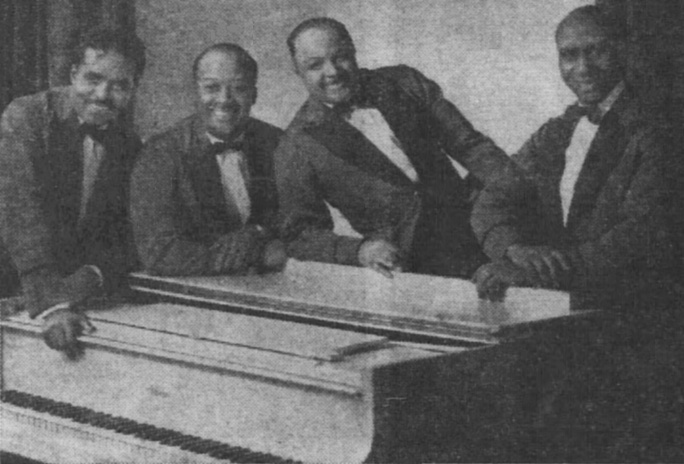
|

|
"Sleepy Time Gal"/"Song Of The Wanderer"
by The Ebonaires
on Modern 20-656B/A
released in 1949

|
Above: The Ebonaires. There were two separate "Ebonaires", the "Original Deep River Singers" group and the one that recorded for Modern and Aladdin, which was led by John Dix.DAILY DISPATCH (Moline, Illinois), February 11, 1948:
THE EBONAIRES—The February meeting of the Woman's Club of Moline.... will feature the Ebonaires, the original Deep River Singers. One of the finest singing groups in America, these stars of radio, concert, and theater, have been featured in long runs of "Porgy And Bess" and "Swing Mikado." Their repertoire includes everything for which colored singers and entertainers are noted, spirituals, folk songs, Gershwin compositions and others. The quartet has been singing together for 20 years, during which time it has done much to create inter-racial good will and understanding. Working on the Railroad, Shortnin' Bread, Old Man River, Swing Low Sweet Chariot are some of the numbers the audience can expect to hear. The Ebonaires have appeared on several national radio networks and have made 38 extended tours of the United States, Canada, Mexico, and Cuba.ANOTHER ARTICLE ACCOMPANYING THE SAME PICTURE....
BATTLE CREEK ENQUIRER (Michigan), April 15, 1949:
SONGS BY THE EBONAIRES COVER VARIED RANGE—The Ebonaires, who will present a program of songs here Saturday night, April 23, were first formed in 1929 as the "Original Deep River Singers." They organized for the purpose of giving a true interpretation of American folk music and for that reason have emphasized works closely associated with the American Negro. Members of the quartet are Walter Bell and Albert Yarborough, tenors; Earle Robinson, baritone; and James Lapsley, bass. Arthur Crittenden is the piano accompanist.... During the second part of the program, they will appear in old-time plantation costume. In 1930, the quartet won first prize in the Chicagoland Music festival, and was featured later at Chicago's A Century of Progress in 1933 and 1934. In recent years, the group has appeared in leading concert halls and on major radio networks....An article in the California Eagle from March 1948 names The Ebonaires' members as John Dix, bass; James Bradley, baritone; Reuben Vaughn, second tenor; and Charles McCladdie, first tenor.
An article in the Daily Tar Heel (Chapel Hill, NC) from April 1949 names The Ebonaires' members as Merton Smith, tenor; Albert Yarborough, tenor; Earle Robinson, baritone; and James Lapsley, bass.
An article in the Waxahachie Daily Light (Texas) from December 1949 names The Ebonaires' members as Walter Bell, Albert Yarborough, Joseph Giles, and James Collins, and their accompanist James McClendon.
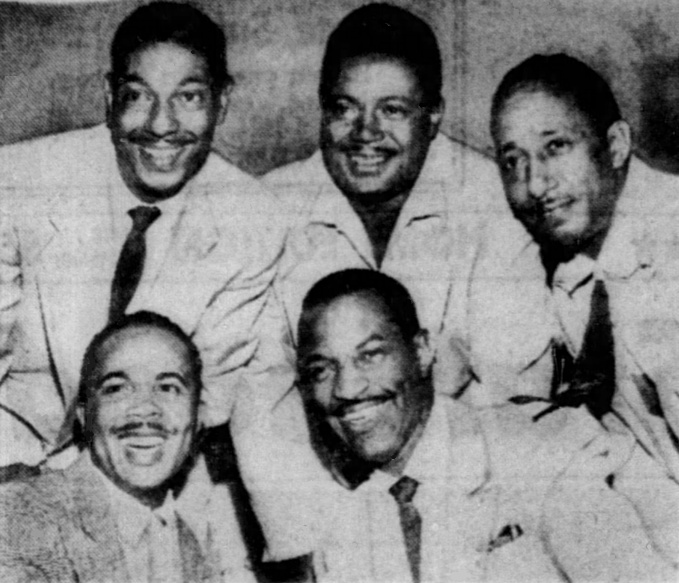
|
HONOLULU STAR BULLETIN, July 6, 1953:
MUSICAL MASTERS—The Ebonaires, top Hollywood singing quartet, arrived by plane over the weekend for appearances at Lau Yee Chai beginning July 10. Left to right, front row, Charles Grose and Ray Wheaton; back row, John Dix, James Bradley, and Edward Jones, pianist-arranger for the group. The Ebonaires have just completed an engagement at the Last Frontier Hotel, Las Vegas, Nevada.(NOTE: Ray Wheaton had been with Dusty Brooks And His Four Tones from 1944 to at least 1950.)
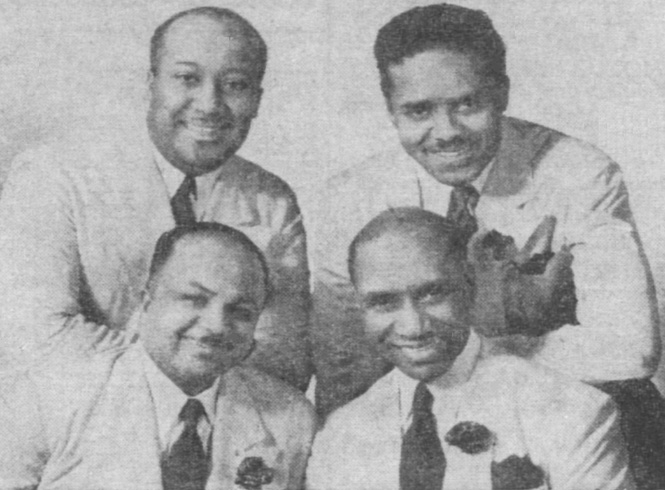
|
JOURNAL AND COURIER (LaFayette, IN), June 25, 1946:
ORIGINAL DEEP RIVER SINGERS, pictured here, will present the opening number in the 1946 "Under The Stars" entertainment series at the Columbian Park Recreation Center. They will inaugurate the programs with a concert Thursday evening, June 27, at 8:15. This male Negro quartet, popular on the air and stage, appeared here several years ago in a similar series, and was popularly received, leading to many requests for their return.... The quartet is now in its 19th year, singing over WGN, on the concert stage, in operettas, and making other arrangements....An article in the Star Tribune (Minneapolis, MN) from May 1946 names The Original Deep River Singers' members as Merton D. Smith, Albert Yarborough, Aaron E. Robinson, and John Burdette.
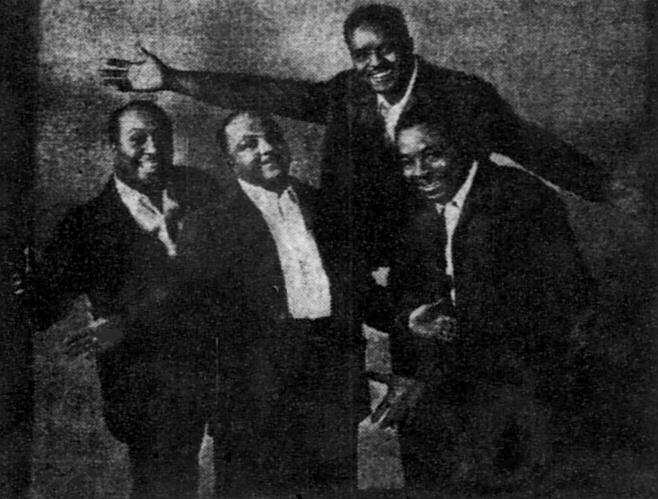
|
ALBUQUERQUE JOURNAL, July 15, 1949:
DEEP RIVER SINGERS: A musical feature of the summer session at the university will be the appearance of the Deep River Singers Wednesday at 8 p.m. at Zimmerman Field. The public is invited without charge to hear the three-part program, including old plantation songs, swing music, and modern classics. Negro spirituals and a presentation from "Porgy And Bess" will be sung by the group.(NOTE: Although not identified as such above, this group is indeed The Ebonaires.)
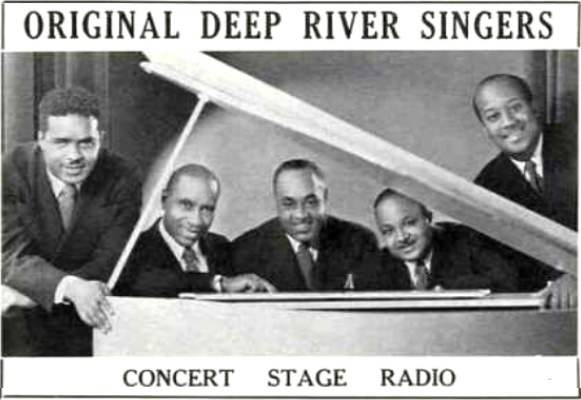
|
(NOTE: Again, the group shown in this photo is The Ebonaires. Members of the quartet shown are Walter Bell and Albert Yarborough, tenors; Earle Robinson, baritone; and James Lapsley, bass. The member second from right is their piano accompanist.)
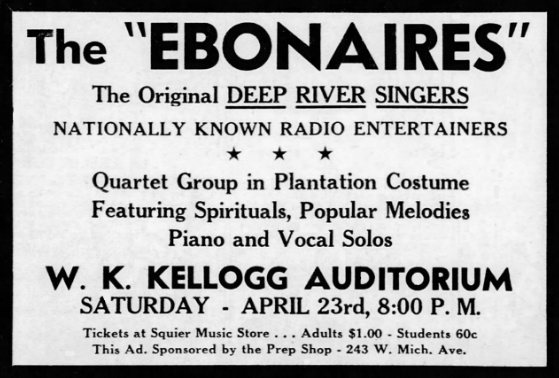
(Battle Creek Enquirer, Michigan, dated 4/17/49) |
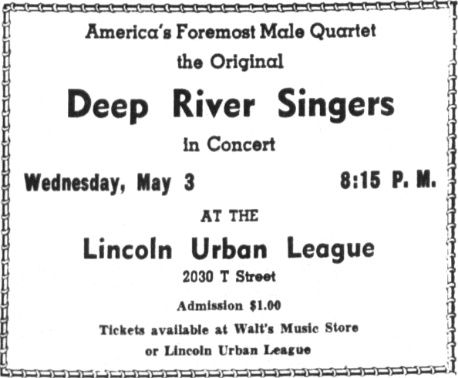
(Lincoln Star, Nebraska, dated 4/30/50) |
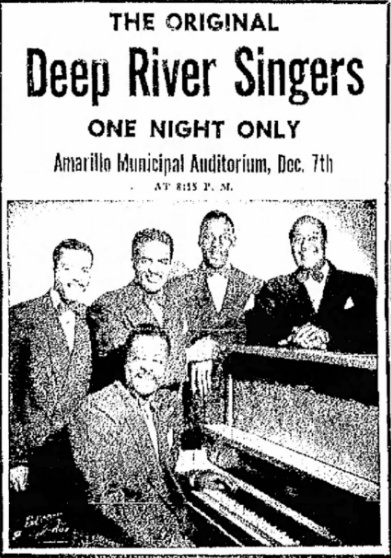
(Amarillo Daily News, Texas, dated 12/5/50) |
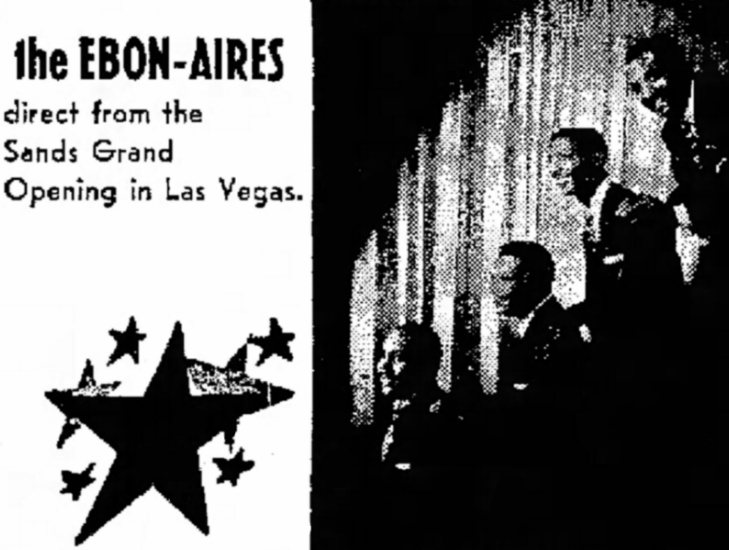
(Tuscon Daily Citizen, Arizona, dated 4/30/53) |
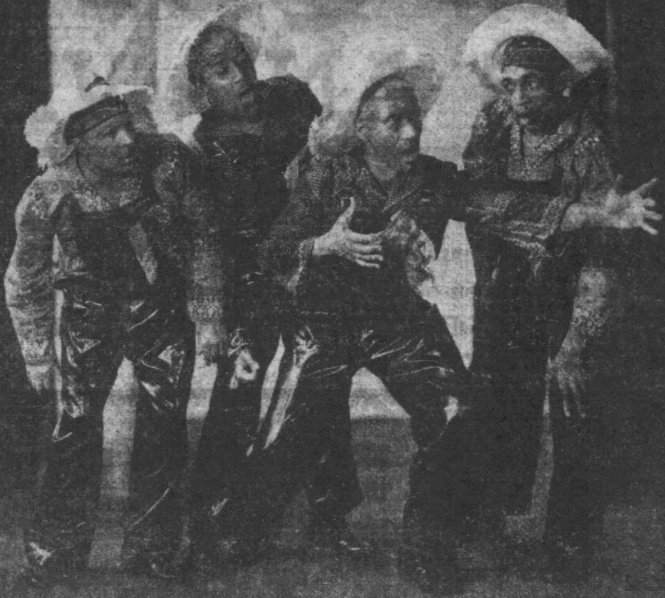
|
JOURNAL AND COURIER (LaFayette, IN), July 10, 1941:
THE DEEP RIVER SINGERS—Columbian Park Recreation Center will open its series of 1941 cultural programs Tuesday evening, July 15, when the distinguished Deep River Singers of New York World Fair fame will present a popular concert of harmony, rhythm, and spirituals. These colored artists were formerly the stars of the Swing Mikado, one of the most successful entertainments at the New York exposition during both years of its run. They are described as vitally entertaining, dramatically gripping, delightfully humorous, and musically different. They are: John Burdette, bass; Albert Page, baritone; Albert Yarborough, tenor; Merton Smith, tenor; and Mary L. Robinson, accompaniste.(NOTE: Albert Yarborough and Merton Smith are the names that match up with members of The Ebonaires [who were also known as "The Original Deep River Singers"].)
EXTRA AUDIO (Windows Media Player):
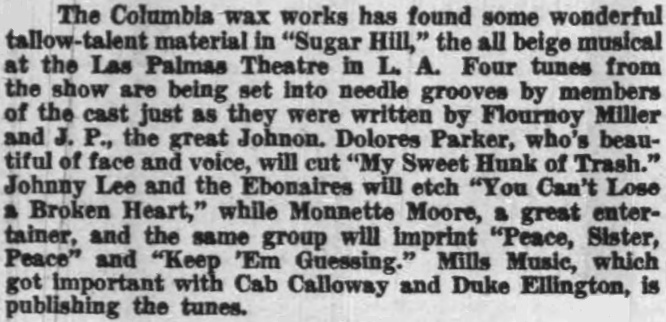
The Billboard Review (9/17/49):
JOHNNIE LEE (THE EBONAIRES) — COLUMBIA 30172....
You Can't Lose A Broken Heart (78) An attractive ballad from "Sugar Hill" flick gets a warm job from Johnnie Lee and vocal group. Lee recalls Jelly Roll Morton's singing.MONETTE MOORE (THE EBONAIRES) — COLUMBIA 30173....
Peace, Sister, Peace (68) Gay production number done by the cast from "Suger Hill."
Not likely to score on wax.
(NOTE: A ratings range of 60-69 was considered "satisfactory" and 70-79 "good".)LISTEN:
1. "You Can't Lose A Broken Heart" - Johnnie Lee And The Ebonaires - Columbia 30172 - 1949.
2. "Peace, Sister, Peace" - Monette Moore And The Ebonaires - Columbia 30173 - 1949.
BOTH played in sequence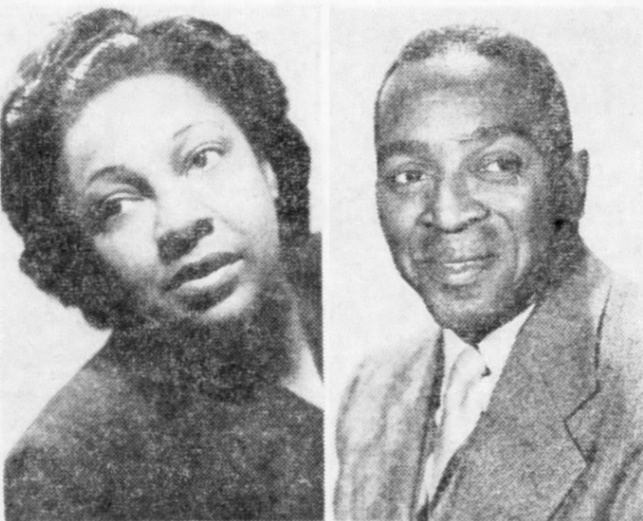
Above: Monette Moore and Johnnie Lee from November 1955.
(Johnnie Lee is more well-known as the shady lawyer Algonquin J. Calhoun on the Amos 'N' Andy TV series and Monette Moore played in numerous sketches in the show.)
EXTRA EXTRA AUDIO (Windows Media Player):
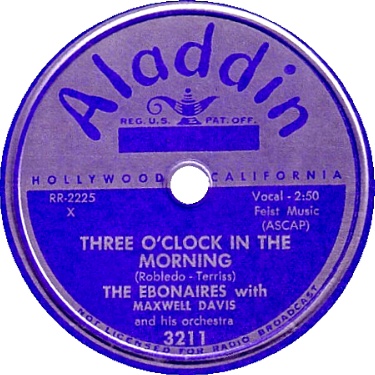
At Left: Label image of Aladdin 3211 ("Three O'Clock In The Morning"), recorded on September 28, 1953 and released in October 1953. The flip is "Baby, You're The One".
An uptempo version of "Three O'Clock In The Morning" was done for Decca by Floyd Ray And His Orchestra in 1939. Floyd Ray And The Blenders did the tune again in 1947, on the Miltone label, with vocal by The Miltones. In 1922, Paul Whiteman's instrumental version was a million-seller.
The Cash Box Review (11/7/53):
THE EBONAIRES — ALADDIN 3211....
Three O'Clock In The Morning (C+) Currently revived via Monte Kelly's lush instrumental, The Ebonaires make a pitch for the R & B market. A lovely tune with a sweet and mellow treatment.
(NOTE: A C+ rating was considered "good".)LISTEN:
1. "Three O'Clock In The Morning" - The Ebonaires - Aladdin 3211 - 1953.
2. "Baby, You're The One" - The Ebonaires - Aladdin 3211 - 1953.
BOTH played in sequence
[Aladdin label image courtesy of Andrew Bohan.]
SHORT ARTICLES AND BLURBS....
ORACLE, February 16, 1942: DEEP RIVER SINGERS FURNISH PROGRAM....
....John Burdette, soloist and musical director of the group, was the only bass-baritone to have appeared in three consecutive seasons at the Chicago Music Festival, after he had won the prize there in 1930 as the best male soloist in America....Albert Page, baritone, graduate of Fisk University and soloist for many years with the Fisk Jubilee Singers....
Albert Yarborough studied under the famous James Mundy in Chicago, spent a number of years singing with the Mundy Jubilee Singers, and appeared at the World's Fair in Chicago as a tenor soloist. He has broadcast for three years from Chicago with the famous Clef Barons Quartet.
Merton Smith.... was given a scholarship by Adolph Muhlmann, well-known music critic and opera coach. He later became principal tenor soloist with the Mundy Jubilee Singers.
Mary L. Robinson, accompanist, ....received her degree at Payne University and a teaching degree from Chicago Musical College....
DAILY REGISTER, October 12, 1950: THE EBONAIRES, POPULAR QUARTET, TO SING....
The Ebonaires, a nationally-known singing organization, will appear.... This popular quartet was organized under the name of The Deep River Singers (the original). To avoid name confusion, they choose the name—The Ebonaires. No negro quartet boasts of such an all-star personnel. Here is a short biographical sketch of each member:Albert Yarborough, who sang the part of Nanki Poo in the popular production Swing Mikado, has a beautiful tenor voice and is recognized as an outstanding Negro musician. He was born in Evanston, Ill. and received his musical training in the American Conservatory of Music.
Walter Bell, who also sings tenor in the quartet, hails from St. Louis. At Lincoln University he majored in music. Before he was inducted into the army in 1942 he was a member of the Legend Singers of St. Louis. He joined the Ebonaires in September, 1947, and is greatly admired for the rare quality of his tenor voice.
Earle Robinson, is the baritone of the quartet. He has a voice of rich quality blended with a deep musical appreciation. Born in St. Louis, he studied music at Lincoln University, and was a member of the Legend Singers of St. Louis. He also studied music at Boston University. Upon his discharge from the army, he entered the Chicago Conservatory of Music. It was there he was discovered by the management of the Ebonaires.
James Lapsley, bass, came to the Ebonaires after having been a star member of New York's Show Boat cast. He sang in their famed quartet and was understudy to one of the leading characters, Joe. Mr. Lapsley was born in Paoli, Kansas, coming to Chicago in 1925. While a doorman at the McCormick Y.M.C.A. his vocal talents were discovered and he was encouraged to take up music as a career. His Chicago recital was well received. He sang the part of Tonio in the opera Pagliacci, and was a guest soloist at Philadelphia's Academy of Music.
Elmer Thomas, accompanist and pianist received his musical education in his home city, Cleveland, Oberline Conservatory and Baldwin-Wallace Conservatory. He was accompanist for the Oleander Quartet, making records for Mercury and Victor. While in the navy he frequently served as an accompanist. His piano playing is one of the high-lights of the Ebonaires' program.
STAR PRESS (Muncie, IN), April 1, 1951: THE EBONAIRES TO SING AT COLLEGE....
The Ebonaires, a nationally known singing organization will appear.... on the Ball State campus. This popular quartet was organized originally in 1929 under the name of the Deep River Singers. In 1930 this quartet entered the Chicago Musicland Festival, winning first prize. Later the group was featured at Chicago's "Century of Progress" in 1933 and 1934....DETROIT FREE PRESS, February 23, 1954: ....Spirituals and jubilee songs are specialties of the Ebonaires, playing a return engagement at Club 509. Baritone Jimmy Bryant is narrator, and the others are tenors Bill Duncan and Gabriel Suggs, and bass Bill Robinson....
At Left: Ebonaires' picture from Detroit Free Press dated 2/23/54.
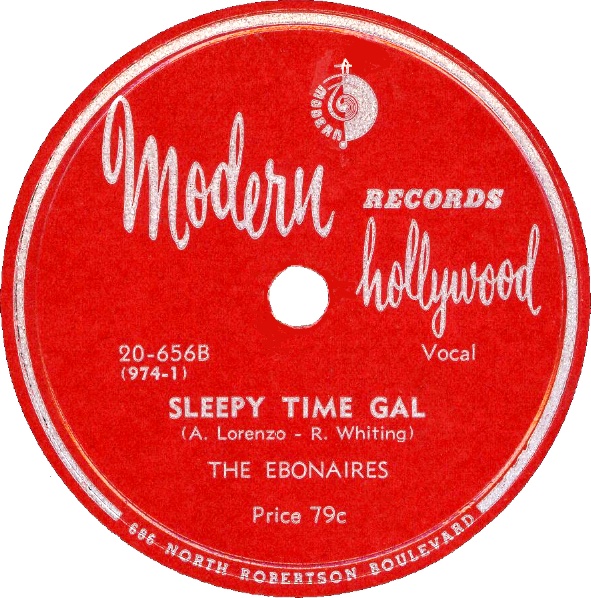
|
Above: Label image of Modern 20-656B released in April 1949.The Ebonaires had releases on Crystal (1947), Colonial (1949), Modern (1949), M-G-M (1949), Aladdin (1953-54), and Money (1956). Also, on records, they vocally backed up Clark Butler (Maestro, 1946), Hadda Brooks (Modern, 1949), Billy Day (Modern, 1949), Johnny Lee (Columbia, 1949), Monette Moore (Columbia, 1949), and Freddy Jackson (Hollywood, 1955-56).
NOTE: Most discographical information provided at this website is from Ferdie Gonzalez' Disco-File.
Listen to this week's selections featuring The Ebonaires on Modern from 1949 using Windows Media Player:
[Audio restoration by Dave Saviet.]
1. Sleepy Time Gal
2. Song Of The Wanderer
BOTH played in sequence
[To download audio files, right-click on link and then select "Save link (target) as..."]